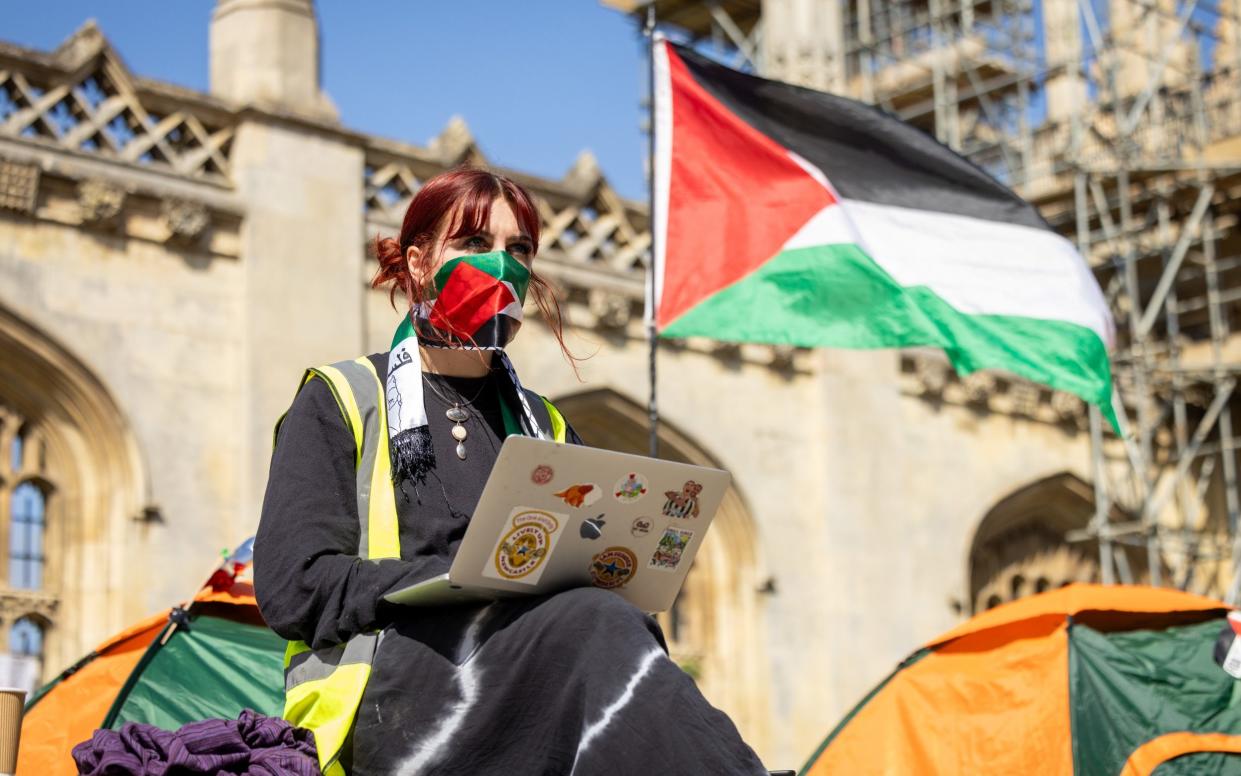‘Stop this anti-Semitic hatred now’, readers call on Rishi Sunak

Followin pro-Palestinian demonstrations at Cambridge and Oxford, Rishi Sunak met with university leaders to discuss the safety of Jewish students.
The Prime Minister warned that the right to protest did not justify the harassment of Jewish students by “a vocal and aggressive minority,” which was driving an “unacceptable rise in anti-Semitism” on campuses.
Ahead of the meeting, and despite the Prime Minister’s warning, Cambridge’s vice-chancellor revealed that the university would not move protesters.
Telegraph readers criticised those taking part in the protests – while also discussing declining university standards, the right to protest and whether the Government should intervene.
‘Suffocated by identity politics and woke activism’
Oxford professor Nigel Biggar joined the discussion on Tuesday, criticising the Oxbridge protesters. Many readers followed suit by arguing how the protests reflected badly on the educational institutions.
Telegraph reader C.T. revealed their child has been deterred from applying for a place at both Cambridge and Oxford due to the involvement in “identity politics” and “woke activism” from both universities – as evidenced by the protests.
They said: “My son is very single minded in his wish to pursue academic excellence but he doesn’t want to go somewhere suffocated by identity politics and woke activism. He now has his eye on top European universities.”
Reader D.J. was not alone in sharing that the protests had encouraged them to cancel ongoing donations to universities they once attended. They said: “Just cancelled my ongoing donation to my old college in Oxford,” as “I don’t want my money going anywhere near these intolerant bigots”.
The protests prompted Richard Fields to reminisce on his time at Cambridge, while also drawing from his own experience as a teacher, to emphasise how far the standard displayed by students has fallen.
He said: “I cannot reconcile the lack of knowledge of these protesters and academics with the students and academics of my time at Cambridge in the early 70s.
“However, in my last few years as a teacher, I was constantly amazed by the paucity of knowledge of most of my students and worse, their lack of a desire for knowledge.”
On the other hand, reader O.T. argued that the students are entitled to their “right to protest and free speech,” believing that they’re simply displaying “democracy in action”.
‘Protests call into question the quality of lecturers and professors’
It emerged on Tuesday that Oxford students protesting against the war had secretly signed up to a demand that millions of Palestinians be allowed to take back their ancestral land in Israel.
Readers were shocked to find out that the university’s head of equality, Vernal Scott, was among those who had signed a letter in support of the demand.
Reader Mel Kay thinks Mr Scott’s actions deem him unsuitable for the role. “Everyone is entitled to hold an opinion, however, expressing it in a public forum when your role is ‘head of equality and diversity’ is clearly a breach of said diversity, equity and inclusion.
“He has a duty to remain fair and impartial, otherwise he is not suitable for the role.”
Similarly, Peter Swales believes that the protests have called into question the quality of professors and lecturers working at the universities. He went on to suggest: “Maybe their qualifications and whether the country should allow them to stay in their post should also be looked into.”
Reader V. Bodie believes the protests “devalues a degree from Cambridge and diminishes trust of employers”.
The Telegraph approached The University of Oxford for comment.
‘Respect the Jewish community and free speech’
Representatives from the Union of Jewish Students (UJS) and the Community Security Trust (CST) attended the roundtable with the Prime Minister and the university vice-chancellors on Thursday. Ahead of the meeting, Gillian Keegan, the Education Secretary, expressed concern over the safety of Jewish students.
Reader Paul Smith called upon the Prime Minister to take action: “What are you going to say to these dangerous university leaders, Mr Sunak?”
“Just saying it is ‘unacceptable’ doesn’t cut it. Introduce new laws and stop this anti-Semitic hatred now. No gentle touch, get tough and do something.”
Meanwhile, Alistair Rockhall looked towards the institutions when debating how best to address the demonstrations.
He argued that the police should “let the UJS decide what they consider anti-Semitic and define the categories on a spectrum ranging from light to serious”.
He believes this needs to be done in order to “respect free speech,” while at the same time “allow protests in areas which are frequented, but do not disrupt university life”.
Edward Fulton called for a proactive approach by the Government and the police, in carrying out their role “to spell out what is legitimate protest and what is intimidation and keep order accordingly”.
He added: “University heads need to also make that position clear and discipline or expel rogue students as is appropriate to the offence.”
Similarly, Simon Bryant suggested that limitations on engaging in political activism should be made a condition for the issuing of student visas.
He said: “I know this is not a total solution but it would reduce their numbers and help keep agents of foreign powers out of our universities.”
Jon Russell, on the other hand, thinks “it’s right our police don’t get involved,” and that the decision to move protesters or let them stay should ultimately lie with the universities.


